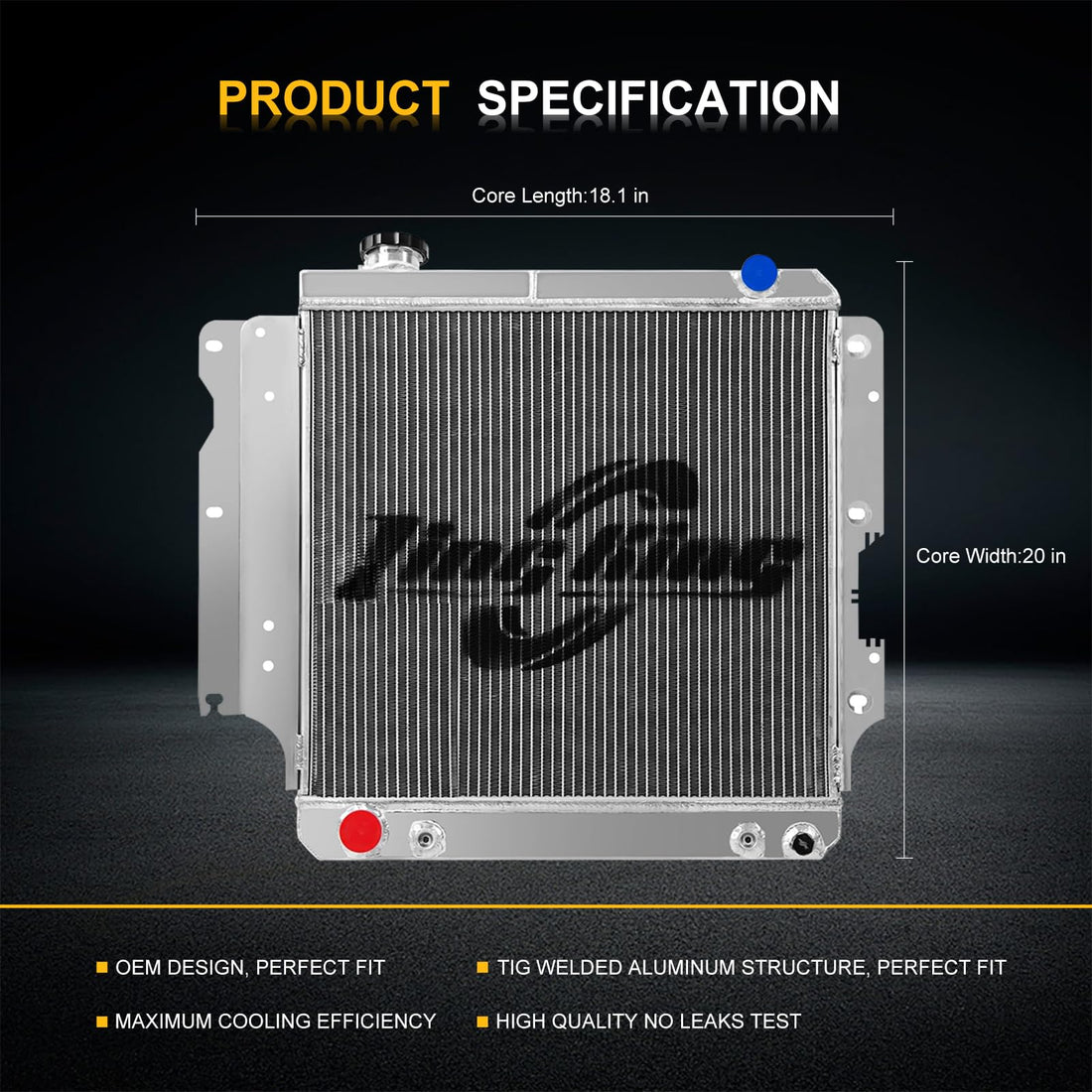
Noticias
The Aluminum vs. Plastic-Aluminum Radiator Dilemma: Cost vs. Performance for Your Chevrolet, Ford, or Jeep
The Aluminum vs. Plastic-Aluminum Radiator Dilemma: Cost vs. Performance for Your Chevrolet, Ford, or Jeep
Your car radiator is the unsung hero of your engine bay. Whether you’re replacing a Chevrolet radiator, Ford radiator, or Jeep radiator, the choice between all-aluminum and plastic-aluminum (aluminum/plastic) radiators is critical. As material innovation accelerates, the "plastic-aluminum" trend gains traction—but is it right for your vehicle? Let’s dissect the cost-performance trade-offs.
Why Material Matters in Radiator Design
-
All-Aluminum Radiators:
Both the core and tanks are 100% aluminum, welded for structural integrity. These excel in high-stress scenarios, like towing or off-roading, where durability is non-negotiable. For Jeep Wrangler models tackling rocky terrain, all-aluminum construction resists impact cracks and corrosion. -
Plastic-Aluminum Radiators:
An aluminum core paired with high-strength plastic tanks. This design dominates OEM replacements for Ford F-Series trucks and Chevrolet Silverados due to cost efficiency. Recent innovations, like high-thermal-conductivity carbon-plastic hybrids, promise 30%+ weight reduction and 30%+ cost savings.
The Cost-Performance Showdown
1. Durability & Longevity:
- All-Aluminum: Superior for extreme conditions. Corvette Z06’s overheating fixes (2017+) relied on upgraded aluminum cooling systems to handle track abuse. Jeep radiator replacements for off-road use often prioritize all-aluminum for crack resistance.
- Plastic-Aluminum: Plastic tanks degrade under heat cycles, risking leaks. A 2006 Jeep Grand Cherokee recall linked plastic-tank failures to engine overheating. However, newer engineering plastics (e.g., polyamide) enhance chemical/UV resistance.
2. Cooling Efficiency:
- Thermal conductivity favors aluminum. Its pure-metal structure dissipates heat ~40% faster than plastic-aluminum hybrids—crucial for high-output engines like the Ford Mustang GT or Chevrolet Camaro.
- Counterpoint: Advanced plastics with carbon alloys (e.g., BenSong’s material) now match 60–80% of aluminum’s conductivity, making them viable for daily-driven Ford trucks and Chevrolet SUVs.
3. Cost & Weight Savings:
- Plastic-aluminum radiators cost 30–50% less than all-aluminum units. For budget-conscious owners replacing a Jeep Cherokee radiator, this is a key selling point.
- Weight reduction (up to 30%+) aids fuel efficiency—a win for eco-conscious buyers.
4. Environmental Impact:
- “Plastic-aluminum” radiators cut production carbon emissions by 60%+ and avoid aluminum’s energy-intensive smelting.
- Recycling remains a challenge: Plastic tanks are harder to repurpose than all-aluminum radiators.
Which Radiator Fits Your Chevrolet, Ford, or Jeep?
1. Choose All-Aluminum If:
- You drive a performance Chevrolet Corvette, heavy-duty Ford F-150, or off-road Jeep Wrangler.
- Prioritize longevity over upfront cost.
- Operate in extreme heat or towing conditions.
2. Choose Plastic-Aluminum If:
- You need an OE-spec, budget-friendly replacement for daily driving.
- Own a standard Chevrolet Malibu, Ford Escape, or Jeep Grand Cherokee.
- Value lightweight design and eco benefits.
The Verdict
While all-aluminum radiators lead in raw performance, plastic-aluminum radiators are evolving rapidly. Brands like BenSong now supply automakers (e.g., Geely, BYD) with carbon-plastic composites that balance cost and cooling—signaling a material shift in the industry.
For now:
- Performance/Extreme Use: Stick with all-aluminum for your Ford, Jeep, or Chevrolet radiator.
- Daily Driving/OE Reliability: High-quality plastic-aluminum remains a smart, cost-effective choice.
Upgrade wisely. Your engine’s life depends on it.
If you have any needs,please refer to www.zing-king.store
#CarRadiator #RadiatorReplacement #ChevroletRadiator #FordRadiator #JeepRadiator #AllAluminumRadiator #PlasticAluminumRadiator #AutoParts #EngineCooling #CarMaintenance #PerformanceParts #OffRoadJeep #FordTrucks #ChevySilverado #JeepWrangler #RadiatorUpgrade #CostVsPerformance #EcoFriendlyAuto #ShopifyAutoParts
